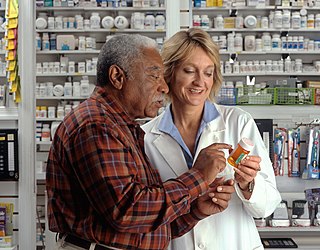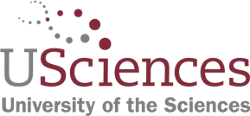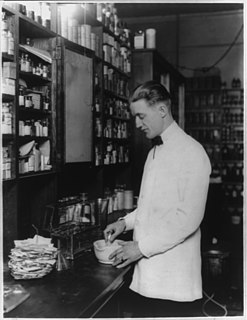Related Research Articles

Pharmacists, also known as chemists or druggists, are health professionals who control, formulate, preserve and dispense medications and provide advice and counselling on how medicines should be used to achieve maximum benefit, minimal side effects and to avoid drug interactions. They also serve as primary care providers in the community. Pharmacists undergo university or graduate-level education to understand the biochemical mechanisms and actions of drugs, drug uses, therapeutic roles, side effects, potential drug interactions, and monitoring parameters. This is mated to anatomy, physiology, and pathophysiology. Pharmacists interpret and communicate this specialized knowledge to patients, physicians, and other health care providers.

University of the Sciences in Philadelphia was a private university in Philadelphia, Pennsylvania. USciences offered bachelor's, master's, and doctoral degrees in pharmacy and other health-related disciplines. The university was conceived in 1821 and chartered in 1822 as Philadelphia College of Pharmacy (PCP), the first pharmacy college in the nation. It offered more than 30 degree and certification programs across a wide range of pharmaceutical and healthcare-related disciplines. On June 1, 2022, it officially merged into Saint Joseph's University.

Pharmacy is the clinical health science that links medical science with chemistry and it is charged with the discovery, production, disposal, safe and effective use, and control of medications and drugs. The practice of pharmacy requires excellent knowledge of drugs, their mechanism of action, side effects, interactions, mobility and toxicity. At the same time, it requires knowledge of treatment and understanding of the pathological process. Some specialties of pharmacists, such as that of clinical pharmacists, require other skills, e.g. knowledge about the acquisition and evaluation of physical and laboratory data.

A prescription, often abbreviated ℞ or Rx, is a formal communication from a physician or other registered health-care professional to a pharmacist, authorizing them to dispense a specific prescription drug for a specific patient. Historically, it was a physician's instruction to an apothecary listing the materials to be compounded into a treatment—the symbol ℞ comes from the first word of a medieval prescription, Latin: Recipere, that gave the list of the materials to be compounded.
A Doctor of Pharmacy is a professional doctorate in pharmacy. In some countries, it is a doctoral degree to practice the profession of pharmacy or to become a clinical pharmacist. In many countries they are allowed to practice independently and can prescribe drugs directly to patients. A Phd program has significant experiential or clinical education components in introductory and advanced levels for the safe and effective use of drugs. Experiential education prepares graduates to be practice-ready, as they already have spent a significant amount of time training in areas of direct patient care and research.
A Bachelor of Pharmacy is a graduate academic degree in the field of pharmacy. In many countries, this degree is a prerequisite for registration to practice as a pharmacist. Since both PharmB and PharmD are prerequisites to license in most western countries they're considered equivalent. In many western countries, the foreign graduates with BPharm, PharmB or BS Pharm practice similarly as PharmD graduates. It is analogous to MBBS vs. MD where MBBS is foreign equivalent of MD. It is training to understand the properties and impacts of medicines and developing the skills required to counsel patients about their use.

In the field of pharmacy, compounding is preparation of a custom formulation of a medication to fit a unique need of a patient that cannot be met with commercially available products. This may be done for medical reasons, such as administration in a different format, to avoid a non-active ingredient the patient is allergic to, or to provide an exact dose that isn't commercially available. Medically necessary compounding is referred to as "traditional" compounding. It may also be done for medically optional reasons, such as preference of flavor or texture, or dietary restrictions.
The University of Cincinnati Academic Health Center (AHC) is a collection of health colleges and institutions of the University of Cincinnati, Cincinnati, Ohio. It trains health care professionals and provides research and patient care. AHC has strong ties to UC Health, which includes the University of Cincinnati Medical Center and West Chester Hospital.

Daniel B. Smith was an educator, pharmacist, and taxidermist in Philadelphia, Pennsylvania.
A veterinary pharmacist is a specially trained pharmacist who dispenses veterinary drugs and supplies or products and advice to owners of companion animals and livestock. In addition, they advise the regulatory bodies and are involved in the formulation of veterinary drugs. Veterinary pharmacy is a field of pharmacy practice, in which veterinary pharmacists may compound medications, fill prescriptions, and manage drug therapies for animals. Veterinary pharmacists are licensed pharmacists who specialize in the distribution of medications for animals.

Clinical pharmacy is the branch of pharmacy in which clinical pharmacists provide direct patient care that optimizes the use of medication and promotes health, wellness, and disease prevention. Clinical pharmacists care for patients in all health care settings but the clinical pharmacy movement initially began inside hospitals and clinics. Clinical pharmacists often work in collaboration with physicians, physician assistants, nurse practitioners, and other healthcare professionals. Clinical pharmacists can enter into a formal collaborative practice agreement with another healthcare provider, generally one or more physicians, that allows pharmacists to prescribe medications and order laboratory tests.
Pharmacy residency is education a pharmacist can pursue beyond the degree required for licensing as a pharmacist. A pharmacy residency program allows for the implementation of skill set and knowledge acquired in pharmacy school through interaction with the public either in a hospital setting or community practice. The program is done over a span of about 2yrs after graduation from pharmacy school and licensure as a pharmacist. Pharmacy residency helps improve the resume of a pharmacist so as to increase chances of obtaining employment outside community practice. A 2022 review suggested that there is sufficient evidence that residency develops key competencies for junior pharmacists.
The basic requirement for pharmacists to be considered for registration is often an undergraduate or postgraduate pharmacy degree from a recognized university. In many countries, this involves a four- or five-year course to attain a bachelor of pharmacy or master of pharmacy degree.

A pharmacy is a retail shop which provides pharmaceutical drugs, among other products. At the pharmacy, a pharmacist oversees the fulfillment of medical prescriptions and is available to counsel patients about prescription and over-the-counter drugs or about healthcare and wellness issues. A typical pharmacy would be in the commercial area of a community. Mail-order dispensing is a recent development.
Electronic prescription is the computer-based electronic generation, transmission, and filling of a medical prescription, taking the place of paper and faxed prescriptions. E-prescribing allows a physician, physician assistant, pharmacist, or nurse practitioner to use digital prescription software to electronically transmit a new prescription or renewal authorization to a community or mail-order pharmacy. It outlines the ability to send error-free, accurate, and understandable prescriptions electronically from the healthcare provider to the pharmacy. E-prescribing is meant to reduce the risks associated with traditional prescription script writing. It is also one of the major reasons for the push for electronic medical records. By sharing medical prescription information, e-prescribing seeks to connect the patient's team of healthcare providers to facilitate knowledgeable decision making.
Bankole A. Johnson, DSc, MD, MPhil, FRCPsych is a licensed physician and board-certified psychiatrist throughout Europe and the United States who served as Alumni Professor and Chairman of the Department of Psychiatry and Neurobehavioral Sciences at the University of Virginia. Johnson's primary area of research expertise is the psychopharmacology of medications for treating addictions, and he is well known in the field for his discovery that topiramate, a gamma-aminobutyric acid (GABA) facilitator and glutamate antagonist, is an effective treatment for alcoholism. Professor Johnson also received national media attention for his appearance in the Home Box Office (HBO) original documentary feature, "Addiction", which won the prestigious Governors Award, a special Emmy Award, from the Academy of Television Arts and Sciences. Professor Johnson recently accepted an appointment to join the University of Maryland as the Chairman of Psychiatry and to lead a Brain Science Research Consortium in the neurosciences.

Remote dispensing is used in health care environments to describe the use of automated systems to dispense prescription medications without an on-site pharmacist. This practice is most common in long-term care facilities and correctional institutions that do not find it practical to operate a full-service in-house pharmacy.

The history of pharmacy in the United States is the story of a melting pot of new pharmaceutical ideas and innovations drawn from advancements that Europeans shared, Native American medicine and newly discovered medicinal plants in the New World. American pharmacy grew from this fertile mixture, and has impacted U.S. history, and the global course of pharmacy.
Separation of prescribing and dispensing, also called dispensing separation, is a practice in medicine and pharmacy in which the physician who provides a medical prescription is independent from the pharmacist who provides the prescription drug.
The Institute for Safe Medication Practices (ISMP) is an American 501(c)(3) organization focusing on the prevention of medication errors and promoting safe medication practices. It is affiliated with the ECRI Institute.
References
- ↑ "ISMP Staff". www.ismp.org. Archived from the original on 2006-06-16.
- ↑ "Michael R. Cohen, Michael R. Cohen RPh, MS, ScD (hon.), DPS (hon.), FASHP" . Retrieved 19 April 2020.
- ↑ "Check Up". The Philadelphia Inquirer . Retrieved 30 April 2013.
- ↑ "HEDY COHEN Obituary (2021)". The Philadelphia Inquirer . September 2021.
- ↑ "Check Up - Cohen | Philadelphia Inquirer". www.philly.com. Archived from the original on 2010-07-17.